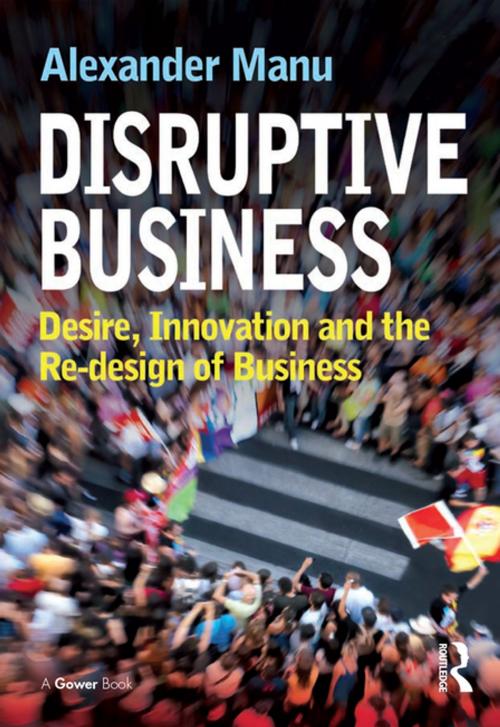Disruptive Business
Desire, Innovation and the Re-design of Business
Business & Finance, Management & Leadership, Management| Author: | Alexander Manu | ISBN: | 9781317149460 |
| Publisher: | Taylor and Francis | Publication: | May 23, 2016 |
| Imprint: | Routledge | Language: | English |
| Author: | Alexander Manu |
| ISBN: | 9781317149460 |
| Publisher: | Taylor and Francis |
| Publication: | May 23, 2016 |
| Imprint: | Routledge |
| Language: | English |
Disruptive Business is a provocative and insightful redefinition of innovation as an outcome of human behaviour, a dynamic in constant change requiring the shaping of new responses in business and the economy. Alexander Manu believes that organizations must treat innovation not as a process to be managed but as an outcome that changes people's lives. In Disruptive Business he explains how innovation is the moment when human behaviour is changed by a particular invention, discovery or event. This position challenges the current understanding of innovation, as well as the current ecology in which innovation operates in organizations: its management, methods, tools, language, focus and metrics. The challenge extends to some of the labels currently applied to innovation typologies, such as 'disruptive innovation', seen today as addressing purely the technological side of an invention, rather than the more complex motivational and behavioural side. Alexander Manu considers that a disruption is not manifest in the moment a new technology is introduced. The disruption is the human being and manifest only when human motivation embraces the technology and uses it to modify and improve everyday life. Our acceptance and appropriation of new technologies creates the business disruption. Manu makes the case that successful innovation outcomes are answers to conscious or subconscious goals residing in human motivation, and motivation starts in desire. This position is consistent with the history of innovations that have changed, improved and reshaped human life, and also consistent with their roots and ethos. Humans are a 'perpetually wanting animal', bound to desire, to seek media for a better self and to need innovation. In this dynamic, innovation is the constant and business is the variable. The role of business is to create the tools, objects and services through which people can manifest what they want and who they are. The book provides a new perspective of current behavioural disruptions which are relevant to the continuity of business, as well as a set of practical methodologies for business design, aimed at creating innovation outcomes of value to users.
Disruptive Business is a provocative and insightful redefinition of innovation as an outcome of human behaviour, a dynamic in constant change requiring the shaping of new responses in business and the economy. Alexander Manu believes that organizations must treat innovation not as a process to be managed but as an outcome that changes people's lives. In Disruptive Business he explains how innovation is the moment when human behaviour is changed by a particular invention, discovery or event. This position challenges the current understanding of innovation, as well as the current ecology in which innovation operates in organizations: its management, methods, tools, language, focus and metrics. The challenge extends to some of the labels currently applied to innovation typologies, such as 'disruptive innovation', seen today as addressing purely the technological side of an invention, rather than the more complex motivational and behavioural side. Alexander Manu considers that a disruption is not manifest in the moment a new technology is introduced. The disruption is the human being and manifest only when human motivation embraces the technology and uses it to modify and improve everyday life. Our acceptance and appropriation of new technologies creates the business disruption. Manu makes the case that successful innovation outcomes are answers to conscious or subconscious goals residing in human motivation, and motivation starts in desire. This position is consistent with the history of innovations that have changed, improved and reshaped human life, and also consistent with their roots and ethos. Humans are a 'perpetually wanting animal', bound to desire, to seek media for a better self and to need innovation. In this dynamic, innovation is the constant and business is the variable. The role of business is to create the tools, objects and services through which people can manifest what they want and who they are. The book provides a new perspective of current behavioural disruptions which are relevant to the continuity of business, as well as a set of practical methodologies for business design, aimed at creating innovation outcomes of value to users.















